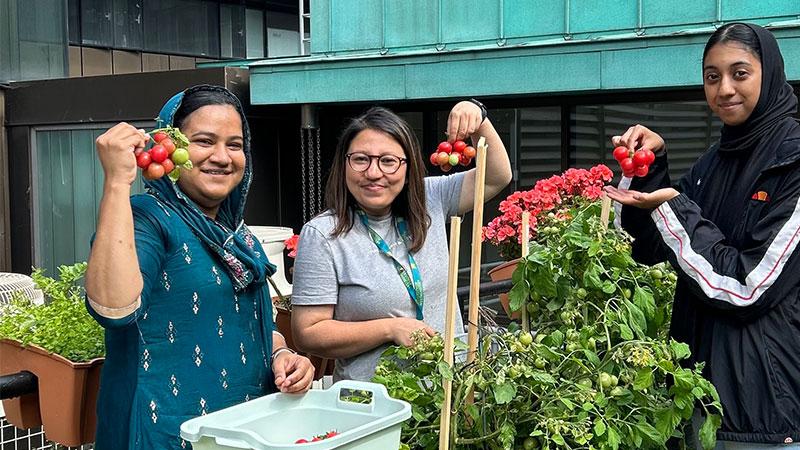Cavendish Living Lab, a Quintin Hogg Trust-funded project which holds authentic learning, sustainability and employability at its core, has seen Westminster students and academics cultivate greens hydroponically on their Central London campus, using food waste from the onsite catering facilities and donating their produce to Euston Foodbank.

The Cavendish Living Lab team uses small scale hydroponic units, ideal for urban environments with limited space, to grow fresh greens.
To grow root vegetables and fruits, they also use nutrient rich compost from food waste collected from the catering facilities on site, one of the project’s sustainability initiatives on campus.
The students involved, who are paid for their time and effort spent with the project, have the opportunity to get involved with growing fresh food and gain crucial work experience, enhancing their employability skills.
The Cavendish Living Lab is open to all Westminster students and uses the University campus as its very own laboratory. It gives students a chance to partner with various stakeholders to address real world issues and co-create innovative and sustainable solutions. There are three strands to the project: Urban Food Growing, Bioplastics Production and Water Management.
Urban Food Growing explores how people can use food waste created in the University to grow food on campus and support a circular economy. So far, the team of staff and students have produced tomatoes, lettuce, parsley, radishes, which have been donated to a local foodbank in London.
The second strand is Bioplastic Production, where students are given the opportunity to grow biobased, sustainable materials to help fight against plastic waste. These materials include bacterial fabric that could be used by Fashion students at the University to create sustainable masterpieces.
Finally, there is Water Management, where students are looking to find ways to reduce water consumption on campus and use wastewater more sustainably. One unique aspect of the Cavendish Living Lab projects is their use of Artificial Intelligence to reduce and manage waste effectively.
The project is one of three Westminster projects to have been shortlisted for the 2023 Green Gown Awards, the most prestigious global recognition of excellence in sustainability within the further and higher education sector.
The two-year project is led by Dr Pooja Basnett, Senior Lecturer in the School of Life Sciences and the Co-Course Leader for the Biological Sciences BSc Honours course. Dr Basnett is also a module leader for the Level 6 module Designing a Sustainable World. Co-Leads are Dr Dipankar Sengupta, and Dr Linda Percy, who are also Senior Lecturers in the School of Life Sciences.
Nadezda Zelve is a first-year Biomedical Sciences student at Westminster and has loved being part of the Cavendish Living Lab. She said: “Cavendish Living Lab gave me an opportunity to meet people from different levels and disciplines who are also passionate about sustainability. It helped me gain confidence in communication as well as enhanced my practical laboratory skills. It has broadened my horizons in terms of future employability and I'm really grateful for that.”
Mehseen Ullah, a first-year Biological Sciences student, added: “Being part of the Cavendish Living Lab project has greatly helped me rediscover my passion for sustainability and gardening. It's given me new opportunities and experiences to connect with other people of similar interests as well working towards making our campus a more sustainable, enjoyable place. I've mostly enjoyed how interactive the project has been and spending time with my team members who share the same goals as me. It's very refreshing to be working mostly outside on your feet rather than spending hours sitting at the desk.”
Speaking about the project, Dr Pooja Basnett said: “Leading the Cavendish Living Lab project alongside my colleagues Dr Linda Percy and Dr Dipankar Sengupta and working with a team of dedicated students has been an incredible experience. Our shared passion for sustainability has connected us in ways that goes beyond our initial goal of designing sustainable solutions. It has fostered a sense of community, collaboration and inspiration. I hope we can continue to work together to create a sustainable world.”
Find out more about sustainability at Westminster.








